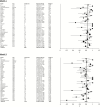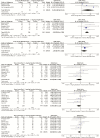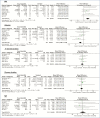Systematic Review and Meta-analysis: Optimal Salvage Therapy in Acute Severe Ulcerative Colitis
- PMID: 30605549
- PMCID: PMC6783899
- DOI: 10.1093/ibd/izy383
Systematic Review and Meta-analysis: Optimal Salvage Therapy in Acute Severe Ulcerative Colitis
Abstract
Background: Infliximab is an effective salvage therapy in acute severe ulcerative colitis; however, the optimal dosing strategy is unknown. We performed a systematic review and meta-analysis to examine the impact of infliximab dosage and intensification on colectomy-free survival in acute severe ulcerative colitis.
Methods: Studies reporting outcomes of hospitalized steroid-refractory acute severe ulcerative colitis treated with infliximab salvage were identified. Infliximab use was categorized by dose, dose number, and schedule. The primary outcome was colectomy-free survival at 3 months. Pooled proportions and odds ratios with 95% confidence intervals were reported.
Results: Forty-one cohorts (n = 2158 cases) were included. Overall colectomy-free survival with infliximab salvage was 79.7% (95% confidence interval [CI], 75.48% to 83.6%) at 3 months and 69.8% (95% CI, 65.7% to 73.7%) at 12 months. Colectomy-free survival at 3 months was superior with 5-mg/kg multiple (≥2) doses compared with single-dose induction (odds ratio [OR], 4.24; 95% CI, 2.44 to 7.36; P < 0.001). However, dose intensification with either high-dose or accelerated strategies was not significantly different to 5-mg/kg standard induction at 3 months (OR, 0.70; 95% CI, 0.39 to 1.27; P = 0.24) despite being utilized in patients with a significantly higher mean C-reactive protein and lower albumin levels.
Conclusions: In acute severe ulcerative colitis, multiple 5-mg/kg infliximab doses are superior to single-dose salvage. Dose-intensified induction outcomes were not significantly different compared to standard induction and were more often used in patients with increased disease severity, which may have confounded the results. This meta-analysis highlights the marked variability in the management of infliximab salvage therapy and the need for further studies to determine the optimal dose strategy.
Keywords: acute severe ulcerative colitis; colectomy; infliximab.
© 2019 Crohn’s & Colitis Foundation. Published by Oxford University Press. All rights reserved. For permissions, please e-mail: journals.permissions@oup.com.
Figures





References
-
- Kaplan GG, Seow CH, Ghosh S, et al. Decreasing colectomy rates for ulcerative colitis: a population-based time trend study. Am J Gastroenterol. 2012;107:1879–1887. - PubMed
-
- Dinesen LC, Walsh AJ, Protic MN, et al. The pattern and outcome of acute severe colitis. J Crohns Colitis. 2010;4:431–437. - PubMed
-
- Narula N, Marshall JK, Colombel JF, et al. Systematic review and meta-analysis: infliximab or cyclosporine as rescue therapy in patients with severe ulcerative colitis refractory to steroids. Am J Gastroenterol. 2016;111:477–491. - PubMed
-
- Hanauer SB, Feagan BG, Lichtenstein GR, et al. ; ACCENT I Study Group Maintenance infliximab for Crohn’s disease: the ACCENT I randomised trial. Lancet. 2002;359:1541–1549. - PubMed
-
- Rutgeerts P, Sandborn WJ, Feagan BG, et al. Infliximab for induction and maintenance therapy for ulcerative colitis. N Engl J Med. 2005;353:2462–2476. - PubMed
Publication types
MeSH terms
Substances
Grants and funding
LinkOut - more resources
Full Text Sources
Medical
Research Materials

